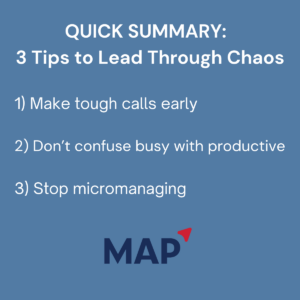Leading Through Chaos: How to Stay Ahead Instead of Playing Catch-Up

When things go sideways, it’s easy to get stuck in reaction mode. You’re putting out fires, answering a million questions, and just trying to stay afloat. But here’s the thing: great leaders don’t just react; they think ahead and make moves that set them (and their teams) up for success. It’s all about shifting from survival mode to strategy mode.
So, What Does It Mean to Be Proactive?
Being proactive means focusing on what really matters—the key strategies that actually drive results. Instead of getting lost in the daily chaos, proactive leaders create a plan and stick to it (even when that plan has to change!).
Signs You’re Stuck in Reactive Mode
Ever feel like you’re just spinning your wheels? If any of these sound familiar, you might be stuck in reaction mode:
- Feeling like things are out of control
- Constantly stressed and overwhelmed
- Caught up in negativity and worst-case scenarios
- Becoming the go-to person for every little issue
- Spending all your time putting out fires instead of making progress
- Working in the business instead of on the business
Sound familiar? If so, it’s time to shift gears. Here’s how:
3 Steps to Becoming a More Proactive Leader

- Make the Tough Calls—And Do It Early
- Use the Pareto Principle to maximize efficiency by focusing on the most impactful tasks.
- Block off focused time to weigh your options.
- Give yourself a hard deadline for key decisions.
- Take action—even when it’s uncomfortable.
- Don’t let uncertainty drag you down. Indecision kills momentum.
- Stop Mistaking “Busy” for “Productive”
- Focus on the big wins that actually move the needle.
- Cut out time-wasting distractions that don’t add value.
- Being “crazy busy” often means bad prioritization—fix that!
- Get your priorities straight—leave “busy work” to the bees!
- Let Go of Micromanaging—Seriously
- Empower your team to handle things without you.
- Assign tasks wisely—keep leadership decisions for yourself.
- Recognize and reward success (it keeps motivation high!).
- Stop solving everyone’s problems—train them to bring solutions, not just issues.
- Once you delegate properly, you’ll have time to think big and lead!
At the end of the day, the best leaders aren’t just reacting to problems—they’re creating opportunities. So, are you ready to stop just surviving and start thriving? Make the shift today—your team (and your sanity) will thank you!
Ps. Download our free resource Navigating Business Challenges: A Strategic Approach



